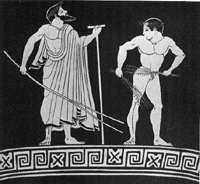The story about Milo of Kroton—a famous ancient athlete
[ 2006-09-21 15:43 ]
与现代的同行一样,古代运动员也有吸引公众注意力的独特方法。许多古希腊作家纷纷记录了一位古代奥运冠军传奇般的英雄事迹。这个故事要讲述的就是这位著名的古代奥运冠军——米洛的传奇一生。
 Like
their modern counterparts, ancient athletes had a way of capturing the public's
imagination. Several ancient authors such as Pindar, Pausanias, Strabo, and Dio
Chrysostom record the noteworthy exploits of some of the best-known Olympic
victors of ancient times. Like
their modern counterparts, ancient athletes had a way of capturing the public's
imagination. Several ancient authors such as Pindar, Pausanias, Strabo, and Dio
Chrysostom record the noteworthy exploits of some of the best-known Olympic
victors of ancient times.
Here is a very famous
ancient athlete' story.
One of the most legendary athletes in the ancient
world, Milo of Kroton, wore the victor's crown at Olympia no less than six
times. Born in southern Italy, where Greece had many colonies, Milo won the
boys' wrestling contest in 540 BCE.
He returned eight years later to win
the first of five consecutive wrestling titles, a feat that seems incredible by
modern standards. Rarely do modern-day Olympians compete in more than two or
three Olympiads over the course of a career. Much like the boxer George Foreman,
Milo resisted retirement: By the time of the 67th Olympiad in 512 BCE, Milo was
probably forty or more years old but he competed anyhow. The challenger won not
by overpowering Milo, but by avoiding the older wrestler and wearing him out.
According to our ancient sources, Milo enjoyed showing off his unrivaled
strength. For instance, he would clasp a pomegranate in his hand and have others
try to take it away from him. Even though he was holding it so tightly that no
one could remove it, he never damaged the fruit. Sometimes, he would stand on a
greased iron disk and challenge others to push him off of it. Another of his
favorite exhibitions was tying a cord around his forehead, holding his breath,
and breaking the cord with his bulging forehead veins. Other times, the wrestler
would stand with his right arm at his side, his elbow against him, and hold out
his hand with thumb pointed upwards and fingers spread. No one could
successfully bend even his little finger.
Milo excelled even in warfare. When a neighboring town
attacked Kroton, Milo entered the battle wearing his Olympic crowns and dressed
like Herakles, in lion's skin and brandishing a club, and led his fellow
citizens to victory.
A follower of the famous philosopher Pythagoras,
Milo once saved his friends. It happened that the roof of the hall where the
Pythagoreans were meeting began to collapse. Milo stood and supported the
central pillar until the others escaped to safety and then dashed out, saving
himself.
In the end, however, all of this fame and strength did not save
Milo from a less than glorious death. Milo was wandering through the forest when
he found an old tree trunk with wedges inserted into it. In an attempt to test
his strength, Milo placed his hands and, perhaps his feet, into the cleft of the
trunk and tried to split apart the wood. He succeeded in loosening the wedges,
which fell out, but the trunk closed on his hands, trapping him. There,
according to the tale, he fell prey to wild beasts.
(南开大学通讯员 王乐迪 孙伟供稿)
|